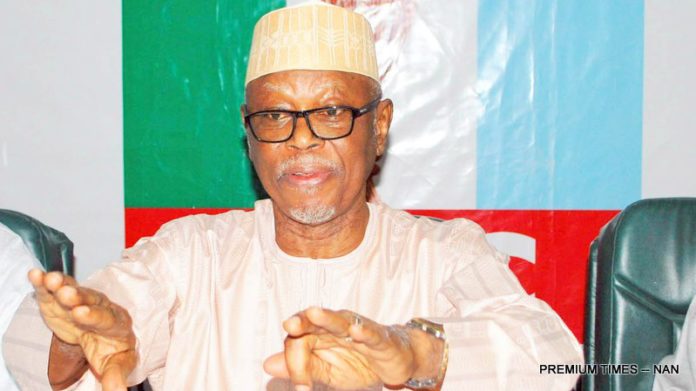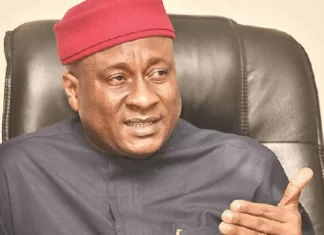By Emeka Alex Duru
Even before the estimated 6,800 delegates at the National Convention of the All Progressives Congress (APC), file out on Saturday, June 23, the outcome, is more or less, known.
With the National Chairman, John Odigie-Oyegun, eventually withdrawing from going for a re-election, the coast has been cleared for Adams Oshiomhole, immediate past Edo State governor, President Muhammadu Buhari’s favourite, to clinch the position.
Oyegun, who pulled out of the race on Friday, June 1, claimed doing so in the interest of the party. He stressed that though he would have loved taking another shot at the office, he was opting out so as not to be part of the problems confronting the party.
´´I do not intend to be part of the problem for APC to solve. It is for this reason that I hereby declare that I will not be seeking re-election as the national chairman”, Oyegun remarked.
The action by the national chairman did not come as a surprise to keen followers of the intrigue-infested politics of the ruling party in the last couple of months.
Other members of the National Working Committee (NWC), who had nursed the ambition of return but were not favoured in the high-wire politics in the party, may also take the Oyegun option or may be eased out of their positions at the end of the day.
APC after Abuja Convention
On the surface, therefore, the contest may be look transparent, free and fair. The question however, is what happens to the party after the exercise.
Since rescheduling the convention from May 14 to the June date, APC has been under intense pressure. Part of the pressure is the fear of the exercise widening the gulf in the party.
Developments within its fold, have not allayed the fear. If anything, they point to likely implosion in the days ahead.
Crisis in the States
APC had in May, held Congresses across the States and the Federal Capital Territory, FCT, with two sets of Executives emerging in no fewer than 24 states.
The States included Kano, Kaduna, Lagos, Kwara, Delta, Rivers, Ondo, Zamfara, Sokoto, Enugu, Kogi, Bayelsa, Oyo, and Ebonyi, Katsina and Abia.
Though the National Publicity Secretary of the party, Bolaji Abdullahi, had denied existence of parallel Congresses, the situation actually exists in many States.
“There is no such thing as parallel Congress. The only recognised Congresses are those organised by the Congress Committees, charged by the party to organise such Congresses”, Abdullahi had said.
Even at that, APC is known to have two executive councils in Kwara, for instance, with one headed by Ishola Balogun Fulani, loyal to Senate President, Bukola Saraki; and an opposing group coordinated by the Minister of Information and Culture, Lai Mohammed.
Dual Congresses were also held in Kaduna State, with a faction loyal to Governor Nasir El-Rufai, and another to Senators Suleiman Hunkuyi and Shehu Sani.
In Kano State, camps loyal to Governor Abdullahi Ganduje and Senator Rabiu Kwankwaso (Kwankwasiyya), held different Congresses and produced two sets of executives.
In Zamfara State, Governor Abdulaziz Yari and Senator Kabiru Marafa produced different set of executives. The trend was replicated in some other places.
Danger within
The fear is the various opposing executives storming the convention ground. Though the convention organisers seem to have taken note of the likely confusion that may arise in such situation and may have made elaborate arrangements to contain the situation, how it impacts on the party, after wards, remains a matter of conjectures.
In related instance, the allegation of marginalisation by the so-called new Peoples Democratic Party (nPDP), which flowed into the APC from the Peoples Democratic Party (PDP), in the build-up to the 2015 general elections, had been largely ignored or dismissed out rightly.
The group, had in a recent memo to APC leadership, raised allegations of being excluded from the affairs of the party, demanding a reversal to the trend, within a specific period.
By Monday, June 4, a continuation of the meeting between the nPDP and the Vice President, Yemi Osinbajo, to address issues raised in the letter, was scheduled.
But while the matter lingered, the APC constituted its national convention committees, without members of the nPDP featuring in any.
To worsen matters, media reports, during the week, had claimed the President, Muhammadu Buhari, vowing not to have any dealing with the group.
nPDP, ANPP, APGA wings lose out
Following the uncertain development in addition to the disdain with which Senate President, Bukola Saraki and Speaker of the House of Representatives, Yakubu Dogara have been visited, the PDP wing of the party, has been effectively whittled.
Also, with Oyegun not going for re-election, the All Nigeria Peoples Party (ANPP) leg of the party, has been seriously bruised.
Not even All Progressives Grand Alliance (APGA) wing of the party has been given its due, given what the Imo State governor, Rochas Okorocha, has been going through in the hands of the APC leadership, lately.
It is thus, essentially the Congress for Progressive Change (CPC), represented by Buhari and Action Congress of Nigeria (ACN), reflected in Osinbajo/Bola Tinubu tendencies that will be calling the shots at the convention.
A Senior Lecturer in the Department of History, Lagos State University (LASU), who pleaded anonymity, predicted the fall of APC with the unfolding development.
“I see implosion in the party. They are beginning to draw imaginary lines in the party. The party leaders are allowing their 2015 victory get to their heads. What you will see next, is the fall of the party”, he told this reporter during the week.
Like PDP, like APC?
The Lecturer, is not entirely pessimistic in his observation. Analysis of faulty moves by PDP in the build-up to the 2015 general elections, lends weight to his remarks.
At the March 24, 2012, National Convention of PDP in Abuja, major positions were parceled out to favoured candidates of former President Goodluck Jonathan in a consensus arrangement that analysts considered highly undemocratic.
Incidentally, while preparations for the convention peaked, the party hierarchy had sold impressions of a party that had exited from its past that was characterised by intrigues.
With the advertisement of the new dawn, there were hopes that internal democracy had returned in the party. On that basis, estranged chieftains of the party who were chiseled out of its mainstream by the dictatorial tendencies of the time, began to nurse a dream of the party returning to the ideals of its forebears.
Hopes of a reformed party were however dashed when few hours to the convention, words filtered out that Bamanga Tukur, Aso Rock candidate and erstwhile governor of defunct Gongola State, had been selected as National Chairman of the party.
His position was merely affirmed at the convention ground.
PDP never recovered from the bad blood that trailed that exercise. Subsequent developments saw the then governors of Sokoto (Aliyu Wamakko), Rivers (Rotimi Amaechi), Adamawa (Murtala Nyako), Kwara (Abdulfatah Ahmed) and Kano (Rabiu Kwankwaso), walking out of the party.
The governors and other chieftains of the party, constituted the nPDP that flowed into the APC and boosted its chances in 2015 polls.
The fear is that with the uncertain climate in APC, a walk-out by estranged members after the convention, may not be ruled out.
That, analysts, say, would mark the commencement of real problem for the ruling party.
Human rights activist and national delegate to the Convention, Tunji Abayomi, however insisted that there was no cause for alarm concerning fears of parallel delegates at the convention, arguing that “The party leadership has the capacity to handle the situation”.
“I don’t think that the emergence of any parallel group will pose a problem or something to brood about. Such development is normal and expected in political party politics as far as democracy is concerned.
“Nigerians should not be distracted by any of such development. What is important, rather is the ability of the party leadership to tackle or handle the matter and I am sure the APC leadership is expected to handle the matter with the due process it requires and they will rise to the challenge”, he toldTheNiche.
















